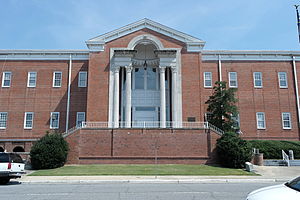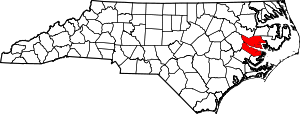Beaufort County, North Carolina
Beaufort County | |
|---|---|
 Beaufort County Courthouse | |
 Location within the U.S. state of North Carolina | |
 North Carolina's location within the U.S. | |
| Coordinates: 35°29′N 76°50′W / 35.48°N 76.84°W | |
| Country | |
| State | |
| Founded | 1739 |
| Named for | Henry, Duke of Beaufort |
| Seat | Washington |
| Largest city | Washington |
| Area | |
• Total | 958 sq mi (2,480 km2) |
| • Land | 827 sq mi (2,140 km2) |
| • Water | 131 sq mi (340 km2) 14% |
| Population (2010) | |
• Total | 47,759 |
| • Density | 58/sq mi (22/km2) |
| Time zone | UTC−5 (Eastern) |
| • Summer (DST) | UTC−4 (EDT) |
| Congressional districts | 1st, 3rd |
| Website | www |
Beaufort County is a county located in the U.S. state of North Carolina. As of the 2010 Census, the population was 47,759.[1] Its county seat is Washington.[2] The county was founded in 1705 as Pamptecough Precinct. Originally included in Bath County, it was renamed Beaufort Precinct in 1712 and became Beaufort County in 1739.[3][4]
Beaufort County comprises the Washington, NC Micropolitan Statistical Area, which is also included in the Greenville-Washington, NC Combined Statistical Area.
Geography
According to the U.S. Census Bureau, the county has a total area of 958 square miles (2,480 km2), of which 827 square miles (2,140 km2) is land and 131 square miles (340 km2) (14%) is water.[5] It is the fifth-largest county in North Carolina by total area.
Adjacent counties
- Washington County (northeast)
- Hyde County (east)
- Pamlico County (southeast)
- Craven County (southwest)
- Pitt County (west)
- Martin County (northwest)
Major highways
Demographics
| Census | Pop. | Note | %± |
|---|---|---|---|
| 1790 | 5,405 | — | |
| 1800 | 6,242 | 15.5% | |
| 1810 | 7,203 | 15.4% | |
| 1820 | 9,850 | 36.7% | |
| 1830 | 10,969 | 11.4% | |
| 1840 | 12,225 | 11.5% | |
| 1850 | 13,816 | 13.0% | |
| 1860 | 14,766 | 6.9% | |
| 1870 | 13,011 | −11.9% | |
| 1880 | 17,474 | 34.3% | |
| 1890 | 21,072 | 20.6% | |
| 1900 | 26,404 | 25.3% | |
| 1910 | 30,877 | 16.9% | |
| 1920 | 31,024 | 0.5% | |
| 1930 | 35,026 | 12.9% | |
| 1940 | 36,431 | 4.0% | |
| 1950 | 37,134 | 1.9% | |
| 1960 | 36,014 | −3.0% | |
| 1970 | 35,980 | −0.1% | |
| 1980 | 40,355 | 12.2% | |
| 1990 | 42,283 | 4.8% | |
| 2000 | 44,958 | 6.3% | |
| 2010 | 47,759 | 6.2% | |
| 2014 (est.) | 47,585 | [6] | −0.4% |
| U.S. Decennial Census[7] 1790-1960[8] 1900-1990[9] 1990-2000[10] 2010-2013[1] | |||
As of the census[11] of 2000, there were 44,958 people, 18,319 households, and 12,951 families residing in the county. The population density was 54 people per square mile (21/km²). There were 22,139 housing units at an average density of 27 per square mile (10/km²). The racial makeup of the county was 68.44% White, 29.03% Black or African American, 0.16% Native American, 0.22% Asian, 0.02% Pacific Islander, 1.42% from other races, and 0.71% from two or more races. 3.24% of the population were Hispanic or Latino of any race.
There were 18,319 households out of which 28.80% had children under the age of 18 living with them, 53.60% were married couples living together, 13.30% had a female householder with no husband present, and 29.30% were non-families. 25.70% of all households were made up of individuals and 11.50% had someone living alone who was 65 years of age or older. The average household size was 2.42 and the average family size was 2.89.
In the county the population was spread out with 23.40% under the age of 18, 7.70% from 18 to 24, 26.10% from 25 to 44, 26.90% from 45 to 64, and 15.90% who were 65 years of age or older. The median age was 40 years. For every 100 females there were 91.10 males. For every 100 females age 18 and over, there were 87.50 males.
The median income for a household in the county was $31,066, and the median income for a family was $37,893. Males had a median income of $30,483 versus $21,339 for females. The per capita income for the county was $16,722. About 15.20% of families and 19.50% of the population were below the poverty line, including 27.60% of those under age 18 and 19.30% of those age 65 or over.
Law and government
Beaufort County is a member of the Mid-East Commission regional council of governments.
Beaufort County is one of the proposed sites for a Navy outlying landing field. This practice airfield would allow pilots to simulate landings on an aircraft carrier. Construction, which has not yet begun, is controversial due to its potential ecological impact.[citation needed]
Communities

See also
35°29′N 76°50′W / 35.48°N 76.84°W
References
- ^ a b "State & County QuickFacts". United States Census Bureau. Retrieved October 17, 2013.
- ^ "Find a County". National Association of Counties. Retrieved 2011-06-07.
- ^ "North Carolina: Individual County Chronologies". North Carolina Atlas of Historical County Boundaries. The Newberry Library. 2009. Retrieved January 20, 2015.
- ^ "Beaufort County". NCpedia. State Library of North Carolina. January 1, 2006. Retrieved January 20, 2015.
- ^ "2010 Census Gazetteer Files". United States Census Bureau. August 22, 2012. Retrieved January 12, 2015.
- ^ "Annual Estimates of the Resident Population for Incorporated Places: April 1, 2010 to July 1, 2014". Retrieved June 4, 2015.
- ^ "U.S. Decennial Census". United States Census Bureau. Retrieved January 12, 2015.
- ^ "Historical Census Browser". University of Virginia Library. Retrieved January 12, 2015.
- ^ Forstall, Richard L., ed. (March 27, 1995). "Population of Counties by Decennial Census: 1900 to 1990". United States Census Bureau. Retrieved January 12, 2015.
- ^ "Census 2000 PHC-T-4. Ranking Tables for Counties: 1990 and 2000" (PDF). United States Census Bureau. April 2, 2001. Retrieved January 12, 2015.
- ^ "American FactFinder". United States Census Bureau. Retrieved 2008-01-31.

